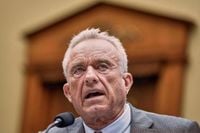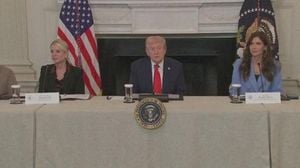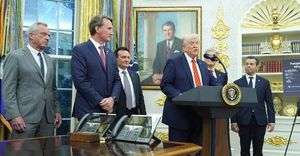In a move that’s stirred up the already simmering debate over childhood vaccinations, the American Academy of Pediatrics (AAP) this week formally recommended that all infants and children aged 6 months through 23 months receive the COVID-19 vaccine—directly opposing recent guidance from the U.S. Department of Health and Human Services (HHS) under Secretary Robert F. Kennedy Jr. The AAP’s updated immunization schedule, released on August 19, 2025, comes as part of a broader overhaul that also includes changes to recommendations for the hepatitis, RSV, influenza, and HPV vaccines.
The timing and content of the AAP’s announcement were no accident. Earlier this year, Secretary Kennedy had removed COVID-19 vaccines as a federal recommendation for healthy children and pregnant women, a dramatic departure from the positions held since the pandemic’s early days. That decision, made in May, drew immediate criticism from doctors and public health organizations, who argued it put vulnerable populations at risk and undermined public trust in immunization policy.
“The AAP will continue to provide recommendations for immunisations that are rooted in science and are in the best interest of the health of infants, children and adolescents,” said AAP President Susan Kressly in a statement quoted by Bloomberg. She emphasized that the group’s guidance is based on rigorous evidence, not external pressure: “We are transparent about our funders, follow rigorous conflict-of-interest disclosures and maintain safeguards to ensure the integrity and independence of our guidance.”
But Kennedy wasted no time in firing back. Hours after the AAP’s announcement, he took to X (formerly Twitter) to accuse the pediatricians’ group of being “corporate friendly,” pointing to donations it receives from vaccine makers such as Pfizer and Moderna through its Friends of Children Fund. According to Kennedy, these financial ties raise questions about whether the AAP’s recommendations are truly in the public’s interest or simply a “pay-to-play scheme to promote commercial ambitions of AAP’s Big Pharma benefactors.”
This isn’t the first time Kennedy has clashed with the medical establishment. Since taking office, he’s made waves by dismissing all members of the Centers for Disease Control and Prevention’s (CDC) Advisory Committee on Immunization Practices (ACIP) and replacing them with his own appointees—including several known vaccine skeptics. The AAP, in response, boycotted the reconstituted panel’s first meeting in June, labeling it “illegitimate.” Kennedy subsequently barred the AAP and other top medical organizations from collaborating with the new ACIP panel, further deepening the schism.
According to Nexstar Media, the AAP’s Friends of Children Fund, which receives donations from pharmaceutical companies, supports projects aimed at improving child health and equity. Kressly has insisted that these relationships are managed transparently and that the organization maintains “safeguards to ensure the integrity and independence of our guidance.” Still, Kennedy and his supporters remain unconvinced, urging the AAP to make its corporate connections even more public.
The stakes are high, not just for the medical community but for millions of American families. The AAP’s decision to break from both the CDC and HHS has injected uncertainty into the vaccination landscape, particularly around which shots will be covered by insurance or available through federal programs like Vaccines for Children. ACIP traditionally determines which vaccines are covered by insurers and government funds. Now, with the AAP charting its own course, parents and healthcare providers are left to wonder which recommendations will actually translate into accessible care.
“The AAP urges every insurer to cover all the vaccines that are included in this immunisation schedule,” Dr. Kressly told Bloomberg. The new schedule not only calls for COVID-19 shots for young children but also updates other key recommendations: it removes a hepatitis vaccine that is no longer available, advises that children under eight months receive the RSV vaccine, and suggests flu shots for children as young as six months ahead of the upcoming season. Notably, the AAP now recommends the HPV vaccine for children starting at ages 9 to 12, rather than waiting until age 11, as was previously the case.
The federal response to the AAP’s move has been swift and sharp. HHS spokesman Andrew Nixon accused the AAP of “undermining national immunisation policymaking with baseless political attacks,” urging the group to “keep its publications free from financial influence.” Nixon did not elaborate further but echoed Kennedy’s skepticism about the motivations behind the AAP’s recommendations.
Meanwhile, public health experts warn that the ongoing feud could have real-world consequences. As reported by Reuters, Kennedy’s overhaul of ACIP and his removal of COVID-19 vaccine recommendations for children and pregnant women has prompted concern that life-saving shots could become harder to access. To fill the gap, a new group called the Vaccine Integrity Project—led by researchers at the University of Minnesota—has stepped in to review the latest data on COVID-19, RSV, and flu vaccines. Presenting their findings to professional societies like the AAP on August 19, the group concluded there were no safety concerns for pregnant women receiving the COVID-19 vaccine and that the shot was effective in preventing hospitalizations for children. However, they acknowledged limitations, as their analysis was restricted to published and previously presented data, not ongoing or unpublished clinical trials.
For now, the CDC’s website has been updated to state that healthy children “may receive COVID-19 vaccination, informed by the clinical judgment of a healthcare provider,” a softer stance than the previous universal recommendation for everyone six months and older. This leaves families and providers navigating a patchwork of advice from federal agencies, professional associations, and insurance companies—a confusing landscape at best.
Adding to the uncertainty, the AAP’s move to release its own evidence-based immunization schedule is not unprecedented. The group has been issuing its own guidelines since the 1930s, but the current split with ACIP and the CDC is particularly stark. With the AAP and HHS at odds, and the Vaccine Integrity Project stepping in as a new player, the future of childhood vaccination policy in the U.S. appears more unsettled than ever.
As the debate rages on, one thing is clear: the question of who gets to decide what’s best for America’s children is far from settled. The coming months will likely see more heated exchanges, policy shifts, and, for parents, the ongoing challenge of making the best decision for their families amid a sea of competing voices.




